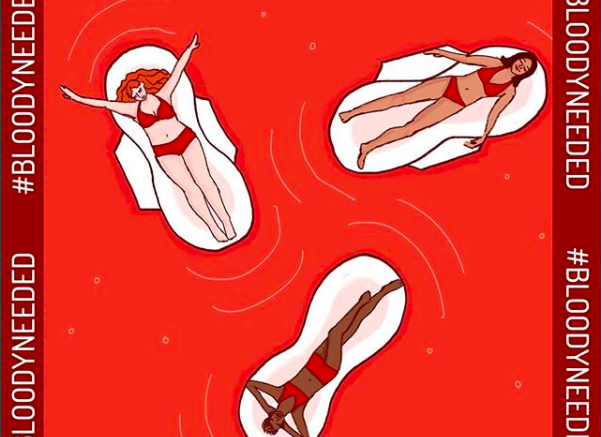“Menstruation would become an enviable, worthy, masculine event: Men would brag about how long and how much. Sanitary supplies would be federally funded and free.”
Written in 1986, Gloria Steinem’s essay, “If men could menstruate” is as relevant today as it was then. Tampons are still taxed as a “luxury item” and one in ten young women (aged 14-21) have been unable to afford period products. In London, this number is closer to one in seven, Plan International UK reported this year.
“Period poverty occurs when a person has to make a choice between food and sanitary items, between going to school or work and risking their menstrual fluid leaking because they can’t afford menstrual supplies,” Alice Walker-Mitchell from the charity Bloody Good Period told Voice of London. Girls in this situation often see their choice as missing school when on their period, or using socks, toilet roll and tissue in lieu of proper sanitary pads.
In the UK Value Added Tax is currently charged at the reduced rate of 5% on sanitary products, including panty liners and certain maternity pads. This is the same rate at which solar panels, child car seats and nicotine patches are taxed. According to the BBC, in a woman’s lifetime, it is predicted that she will spend approximately £1,400 on products, £68 of which on VAT.
Alice notes that “In terms of refugees and asylum seekers, their weekly allowance of £37.75 barely covers food, clothes and transport, leaving many people to make a choice between feeding their family and purchasing menstrual supplies.” Refugees are further halted by the restrictions placed on them working or applying for jobs in the UK, meaning there is no other way to supplement their income without risking their status as refugees and asylum seekers in this country. “Not to mention that it’s been proven that PTSD and past trauma can lead to heavier periods, meaning more supplies would be needed each month.”
At Marylebone last night, I saw a young woman walking up & down outside the toilets looking upset. Turns out she didn't have 30p to go to the loo. I paid for her & she thanked me profusely, she explained she had her period. #PeriodPoverty #HumanRightsDay pic.twitter.com/4PYOsgFkDc
— Sarah Learmonth 🦖 (@SarahCactus1) December 10, 2018
The New York Post reported a poll that claimed 58 per cent of women have felt a sense of embarrassment simply because they were on their period. Forty-two per cent of women have experienced period-shaming, with one in five being made to have these feelings because of comments made by a male friend. Alice explained, “The best way for a stigma to be reduced is to talk about it! One of our focuses as an organisation is to talk to as many people about periods as we can. If we bring the conversation around periods into more public spaces and into pop culture, the taboo surrounding it will be broken!”
If you want to take action or help in any way, you can with Bloody Good Period or Homeless Period UK.
What a fantastic and way of getting donations for refugees and asylum seekers who need our help. A simple donation like this can help bring an end to period poverty #flowhoho https://t.co/7TeJ94LEiR
— Jemimah (@JemimahWard2) December 5, 2018
Or donate to any of the below spots in London…
[googlemaps https://www.google.com/maps/d/u/0/embed?mid=1otKX1-pUFvYcIGHstRGgf-7z1h8_Tkos&w=640&h=480]
Related Articles:
Words and Audio: Fiona Patterson | Fiona Patterson interviewing Medbh Henry
Illustration by Hazel Mead (@hazel.mead) for Bloody Good Period
Subbing: Sorcha Gilheany

